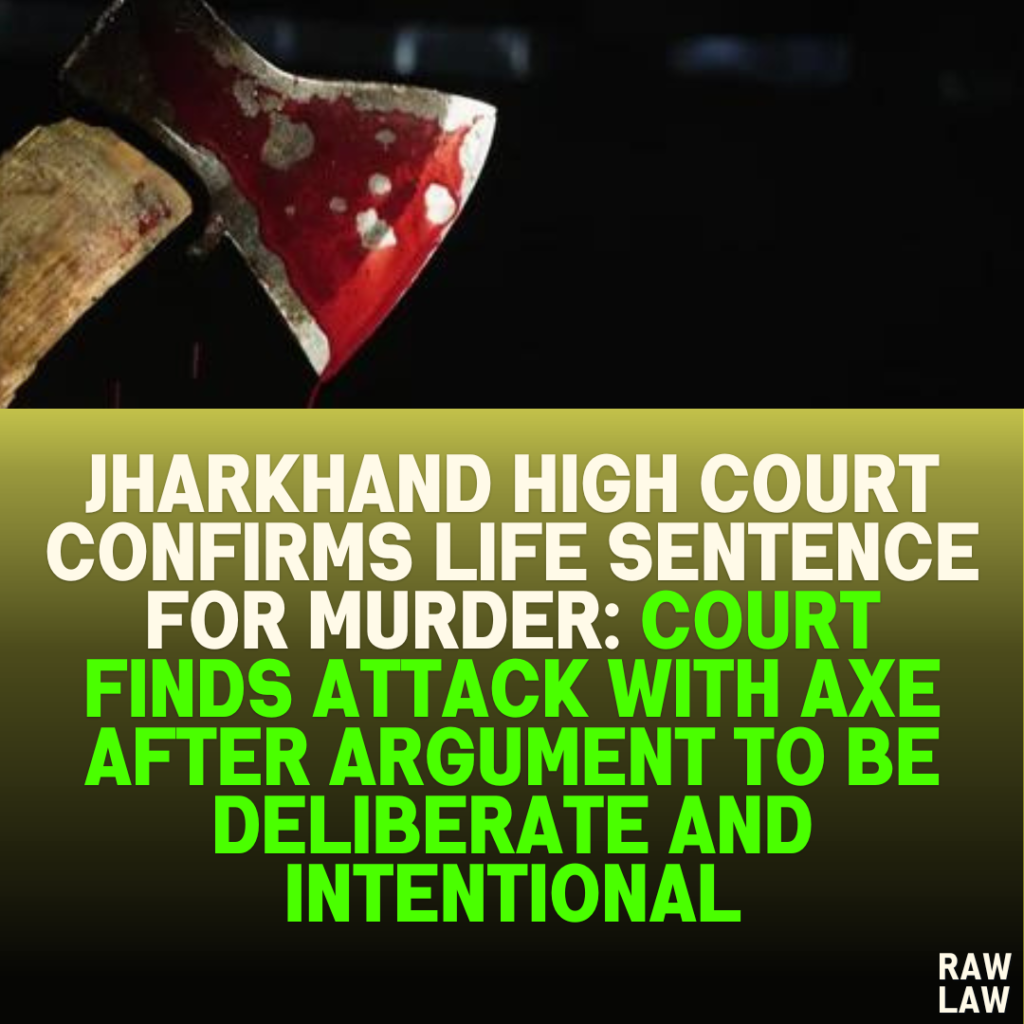Court’s Decision
The Jharkhand High Court upheld the conviction of the appellant under Sections 302 and 324 of the Indian Penal Code for murdering the deceased with an axe after a pre-meditated return to the crime scene. The appellant was sentenced to life imprisonment and a fine of Rs. 500/-.
Facts
The case stems from an incident that occurred on the night of 28th February 2015. The deceased was sitting in his house near the door when the appellant arrived with an axe and struck the deceased on the head. The wife of the deceased raised an alarm, and the villagers rushed to the spot, taking the deceased to the hospital for treatment. The deceased was initially treated at Hariharganj Hospital, referred to a higher medical institution at Dehri, and finally to Varanasi, where he succumbed to his injuries on 3rd March 2015.
The FIR was registered based on the statement (fardbeyan) of the wife of the deceased. The delay in lodging the FIR was explained due to the immediate need for medical treatment. The appellant was charged under Sections 324 and 302 IPC.
Issues
- Whether the delay in lodging the FIR affected the credibility of the prosecution’s case.
- Whether the evidence presented by the prosecution established the guilt of the appellant beyond a reasonable doubt.
- Whether the appellant’s actions amounted to premeditated murder under Section 302 IPC.
Petitioner’s Arguments
- The petitioner argued that there was no direct evidence against him, and the Trial Court erroneously convicted him based on hearsay evidence.
- There were contradictions in the statements of the prosecution witnesses, raising doubts about their credibility.
- The murder weapon was not recovered, which, according to the petitioner, was a significant lapse on the part of the prosecution.
- The unexplained delay in lodging the FIR should render the prosecution’s case unreliable.
Respondent’s Arguments
- The respondent contended that the prosecution had proven the guilt of the appellant beyond a reasonable doubt.
- The testimonies of the witnesses, supported by medical evidence, established that the injury inflicted by the appellant was the direct cause of death.
- The delay in lodging the FIR was justified given the circumstances, as the priority was to save the life of the deceased.
Analysis of the Law
The court reviewed the provisions of Sections 302 and 324 IPC, examining whether the prosecution met the standard of proving the case beyond reasonable doubt. It was held that a minor delay in filing the FIR, in this case, was immaterial, as it was satisfactorily explained. The absence of the murder weapon was not considered fatal since the direct evidence and medical reports corroborated the manner and cause of death.
Precedent Analysis
The court relied on settled principles regarding delay in lodging FIRs and the impact of such delays on the credibility of the prosecution’s case. In various cases, it has been established that if the delay is satisfactorily explained, it does not vitiate the case.
Court’s Reasoning
The court reasoned that the altercation between the deceased and the appellant was initially verbal, but the appellant’s decision to leave, retrieve an axe, and return to attack the deceased indicated a premeditated intent. The nature of the injury, being a sharp incised wound on the head, further pointed to an intention to kill.
The testimonies of the eye-witnesses, despite minor inconsistencies, were found credible and supported by medical evidence. The court noted that non-recovery of the murder weapon was not a ground for acquittal, as long as there was sufficient eyewitness and medical evidence to establish guilt.
Conclusion
The court upheld the conviction of the appellant under Sections 324 and 302 IPC, affirming the life sentence awarded by the Trial Court.
Implications
This judgment reinforces the legal principle that minor delays in lodging FIRs can be justified if satisfactorily explained and do not automatically discredit the prosecution’s case. The ruling also emphasizes that recovery of the weapon is not mandatory for upholding a conviction if other evidence is compelling.




Pingback: Madras High Court Upholds Dismissal of Discharge Petition in Money Laundering Case: Proceeds of Crime Cannot Be Brushed Aside Even if Accused Was Whistleblower - Raw Law
Pingback: Bombay High Court Upholds Rejection of Tenancy Rights Claim Under Bombay Rent Act: “Merely Staying for a Few Years Before Tenant’s Death Does Not Establish Tenancy Rights” - Raw Law
Pingback: Delhi High Court Orders DDA to Issue Allotment Letter and Handover Plot to Petitioner; Directs Compensation of ₹1 Lakh for Prolonged Harassment — “Alternative Plot to be Provided at 2016 Rates if Original Plot Allotted to Third Party” - Raw Law